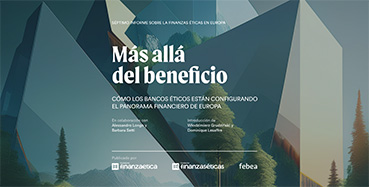The Ethical Finance Foundation and the European Federation of Ethical and Alternative Banks (FEBEA) have published the 7th edition of the Ethical Finance in Europe Report, entitled ‘Beyond Profit. How ethical banks are shaping Europe’s financial landscape’. It is an analysis that highlights the impact of financial institutions operating under alternative banking models in different countries and compares the main issues facing ethical banks and large banks.
Resulting from a collaboration between the Fondazione Finanza Etica, the Ethical Finance Foundation and FEBEA (European Federation of Ethical and Alternative Banks), this report focused on the banking sector, military spending and a European perspective on the social economy.
The first of these, focusing on the banking sector, reveals that ethical banks have a higher capital adequacy ratio of 23.32% compared to 17.23% for large banks, which, according to the document, demonstrates a strong capacity to absorb potential losses.
To do this, they have used a sample of budget data for 10 years up to 31 December 2022 from two banking groups, a total of 26 ethical banks and 60 banks that they have classified as ‘significant’ or large banks.
The operating model of ethical banks prioritises lending to households and businesses rather than investing in low-risk government bonds. Moreover, according to the report, ethical banks demonstrate superior asset strength compared to significant banks and ensure greater security against risk.
Ethical banks manage impaired loans in a responsible and personalised way, prefer customer support solutions and demonstrate a commitment to the real economy and social justice.
The European armament race
The second issue addressed is military spending. The report warns that military spending in NATO member states of the European Union has grown by almost 50%, from 145 billion euros in 2014 to a budget forecast of 215 billion in 2023, which is more than Portugal’s annual GDP.
Moreover, with the war in Ukraine, military spending in 2023 increased by 10 per cent in real terms compared to the previous year. As examples, in a decade Germany has increased real military spending by 42%, Italy by 26% and Spain by 59%. In all countries the increase is entirely due to the purchase of arms and equipment.
Ethical Finance and the Social Economy
The report culminates with a study linking ethical finance and the social economy, a sector that it defines as ‘the future of the European Union’. According to the latest data from the European Commission and CIRIEC, there are some 4.3 million social economy enterprises and organisations operating in EU member states, with 11.5 million paid employees and a turnover of 912 billion euros.
The report recalls that ethical banking entities are governed by the same principles as the social economy and specifies that the most common legal form among FEBEA members is the cooperative.
Eleven of FEBEA’s member companies are cooperatives. All of them are present in countries such as France, Italy, Denmark, Greece, Spain and Belgium, of which seven hold a banking licence (Banca Etica, Cassa Rurale Bolzano, La Nef, Merkur, Cooperative Bank of Chania, Cooperative Bank of Karditsa and Crédit Coopératif), and four others operate as financial services cooperatives: Hefboom, Coop57, Credal and Sefea Holding.







